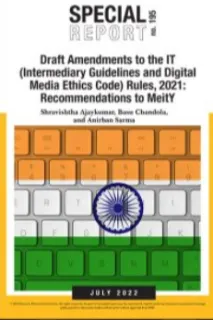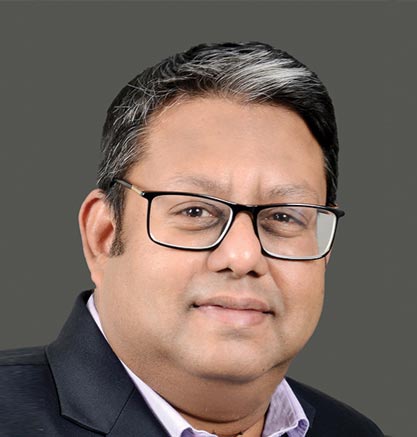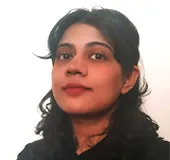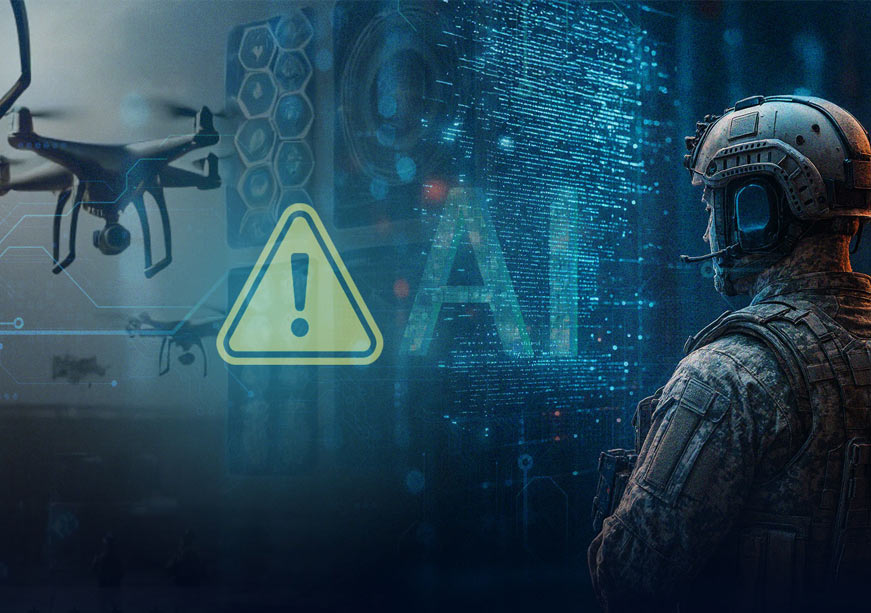Introduction
In February 2021, under the Information Technology Act, 2000,[1] the Ministry of Electronics and Information Technology (MeitY) issued the Information Technology (Intermediary Guidelines and Digital Media Ethics Code) Rules, 2021 (referred to hereafter as the IT Rules),[2] which finalised the draft IT Rules of 2018 and superseded the earlier IT (Intermediary Guidelines) Rules of 2016 and 2011.
Subsequently, in June 2022, MeitY released the proposed draft amendments to the IT Rules[3] for public comment. In early July, the Observer Research Foundation (ORF) submitted its response to the amendments. This report summarises ORF’s comments.
The amendments focus on three principal areas: the creation of a Grievance Appellate Committee (GAC); new expectations from intermediaries;[a] and changes in the grievance redressal mechanisms of intermediaries. ORF’s recommendations relate to the following:
- The nature, composition, and duplication of proceedings due to the creation of the GAC
- The increased accountability, due diligence obligations, and other expectations from intermediaries
- The proposed timelines for redress and removal of complaints
1. The nature and composition of the GAC, and the potential duplication of proceedings
The IT Rules required intermediaries, especially “significant intermediaries” such as social media sites, to appoint a grievance officer to respond to user complaints of the rules being violated. The GAC is being established as a new appellate body for those dissatisfied with the decisions of the intermediaries’ grievance redressal process. The draft document states that the new body—whose members will be government appointees—is being created because there is no appellate mechanism provided by the intermediaries.[4] However, the document contradicts itself when it notes that users already have recourse to courts of law against any intermediary.[5]
There are three other crucial concerns about the GAC: its nature, composition, and possible duplication of proceedings.
1.1 Nature of the GAC
The proposed amendment makes the GAC an appellate body which can overrule any order passed by the intermediary’s grievance officer. It is not clear, however, if the GAC will be an executive, judicial, or quasi-judicial body. The amendment is silent on the functioning of the GAC and the procedures for resolving any appeals made to it. The powers of the GAC need to be clarified–whether it can summon and examine persons on oath, receive evidence, and issue commissions. The nature and scope of the powers will have a significant impact on the nature of the GAC.[6] Without quasi-judicial powers, it will be impossible for the GAC to function effectively.
The amendments provide that the GAC will “deal with appeals expeditiously” (Rule 3(3)(c)) and pass orders which have to be complied with by the concerned intermediary. Again, the scope and limits of the orders have not been clarified. The amendments should categorically define the limits of the powers of the GAC and enunciate the kind of orders it can pronounce. The principles that should guide the GAC in its functioning should also be spelt out.
A piquant situation could arise if the creation of the GAC is read in conjunction with Rule 3(1)(n), which requires intermediaries to respect the rights accorded to citizens by the Indian Constitution. Can a user claim a violation of fundamental rights before the GAC citing Rule 3(1)(n)?
A forum as important as the GAC should be established by an act of Parliament and not a delegated legislation. A delegated legislation must not exceed the limits of the authority conferred by the enabling statute. The creation of a forum like the GAC appears to exceed the power to make rules under Section 87(1) and Section 87(2)(z) and (zg) of the IT Act, 2000.
1.2 Composition of the GAC
The draft amendments provide that the CAG shall consist of a “Chairperson and such other Members, as the Central Government may, by notification in the Official Gazette, appoint” (Rule 3 (3)(a)). Thus, there is wide discretion on the composition and qualifications of members. To increase accountability and transparency, it is suggested that the amendments should also provide clarity on the composition of the GAC. Further, the qualifications of members who can be appointed should be included. Independent members, judicial members, and technical experts should be part of the GAC.
1.3 Duplication of proceedings
The GAC will provide an alternative forum for appeal against the decisions of the intermediaries’ grievance redressal mechanisms. The amendments, however, do not rule out the jurisdiction of the courts or the users’ right to seek judicial remedy. This could lead to duplication of proceedings, contradictory decisions of the GAC and the courts, and “forum shopping” by complainants.
In the case, Chetak Construction Ltd. v. Om Prakash (1998),[7] the Supreme Court observed that “a litigant cannot be permitted ‘choice’ of ‘forum’ and every attempt at ‘forum-shopping’ must be crushed with a heavy hand.” Thus, clarifications should be added in the IT Rules to ensure that forum-shopping is minimised or eliminated.
2. The increased accountability and due diligence obligations of intermediaries, and other expectations from them.
The draft amendments to Rules 3(1)(a), (b), (m) and (n) of the IT Rules, 2021, propose several new obligations for intermediaries. Collectively, these amendments seek to “create a new sense of accountability amongst intermediaries to their users.”[8] The amendments, however, need to be revisited and clarified further.
2.1 Additional due diligence
The amendments propose that intermediaries should not merely publish their rules, regulations, privacy policies, and user agreements governing access and use of computer resources for the benefit of users on their platforms, but also “ensure compliance of the same” (Rule 3(1)(a)). Intermediaries will be expected to “cause the user of its computer resource not to host, display, upload, modify, publish, transmit, store, update or share any information” deemed objectionable under several pre-existing categories of the IT Rules. (Rule 3(1)(b)).
Most intermediaries already make their user agreements, privacy policies, and community guidelines available on their platforms, and periodically inform users of any changes. They also have mechanisms to respond to complaints of objectionable content. The amendments should therefore clarify the following:
- What does the additional obligation of “ensuring compliance” mean in practice?
- How will enshrining this as a legal obligation further enforce compliance or yield additional benefit?
The amendments will make it mandatory for intermediaries to proactively monitor and exercise editorial control over the content that they host. This seems to contradict the function of intermediaries defined in Section 79 of the IT Act, 2000, and also violates the exemption from intermediary liability that the section provides. Section 79 expressly states that:
- “The function of the intermediary is limited to providing access to a communication system over which information made available by third parties is transmitted or temporarily stored or hosted”; and
- “An intermediary shall not be liable for any third party information, data, or communication link made available or hosted by him.”[9]
The particular amendment suggested in Rule (3)(1)(b) of the IT Rules also contradicts the Supreme Court judgement in the Shreya Singhal v. the Union of India (2015)[10] case, which:
- Declared Section 66A of the IT Act unconstitutional as it violated people’s right to free speech and expression; and
- Removed the need for intermediaries to assume an adjudicatory role in deciding what content to restrict or take down, by reading down “actual knowledge” (IT Act, 2000, Sec 79, 3(b)) to mean that there must be a court order directing the intermediary to remove or disable access to any content online.[11] Curiously, the need for “actual knowledge” in the form of a court order is also upheld by Section 3d of the IT Rules.
It is recommended that the amendments to the IT Rules be revisited. A more sensitive approach could be considered to strengthen the accountability of intermediaries, while maintaining their core function and existing safe harbour provisions.
2.1 Ensuring accessibility of services and respecting citizens’ constitutional rights
Rule 3(1)(m) of the amendments to the IT Rules proposes that “the intermediary shall take all reasonable measures to ensure accessibility of its services along with reasonable expectation of due diligence, privacy and transparency”. Rule 3(1)(n) stipulates that “the intermediary shall respect the rights accorded to citizens under the Constitution of India.”
The first stipulation should be clarified further. “Ensuring accessibility” could have different connotations–for example, offering access to services in multiple Indian languages, or ensuring accessibility for groups such as persons with disabilities. If any of these requirements are to become a legal obligation, they should be clearly elucidated.
The particulars of a “reasonable expectation of due diligence, privacy and transparency” are already spelt out by a range of provisions under Rule 3. If the addition of Rule 3(1)(m) implies an incremental change in the obligations of intermediaries, the Rules ought to clarify more precisely what is expected.
The expectation that intermediaries should respect citizens’ constitutional rights is understandable in spirit, but may not be legally tenable. The fundamental rights guaranteed by Article 12 of the Constitution can only be exercised in relation to the state. There is growing recognition that there ought to be some “redressal for the violation of fundamental rights (of citizens) by private parties performing government functions,”[12] but jurisprudence in India to enforce these rights against a private body–such as an intermediary–is still extremely rudimentary and limited. Therefore, the inclusion of Rule 3(1)(n) could be reconsidered as it may not be practicable to enforce such an obligation legally.
3. The proposed timelines for redress and removal of complaints
The views expressed above belong to the author(s). ORF research and analyses now available on Telegram! Click here to access our curated content — blogs, longforms and interviews.

 PDF Download
PDF Download



 PREV
PREV




